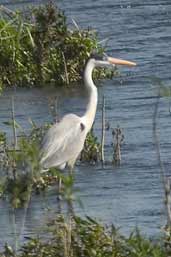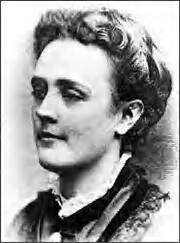A White
Heron

Sarah Orne Jewett
The woods were already filled with shadows one June evening,
though a bright sunset still glimmered faintly among the trunks of the trees. A
little girl was driving home her cow, a plodding, dilatory, provoking creature
in her behavior, but a valued companion for all that. They were going away from
the western light, and striking deep into the dark woods, but their feet were
familiar with the path, and it was no matter whether their eyes could see it of
not.
The companions
followed the shady wood-road, the cow taking slow steps, and the child very
fast ones. Suddenly this little woods-girl is horror-stricken to hear a clear
whistle not very far away. The enemy had discovered her, and called out in a
very cheerful and persuasive tone, “Halloa, little girl, how far is it to the
road?” and a trembling Sylvia answered almost inaudibly, “A good ways.” “I
have been hunting for some birds,” the stranger said kindly, “and I have lost
my way, and need a friend very much. Don’t be afraid,” he added gallantly.
“Speak up and tell me what your name is, and whether you think I can spend the
night at your house, and go out gunning early in the morning.” “My name is
Sylvy” she replied. Mrs. Tilley was standing in the doorway when the trio came
into view. The cow gave a loud moo by way of explanation. The young man stood
his gun beside the door and dropped a heavy game-bag beside it; then he bade
Mrs. Tilley good-evening, and repeated his wayfarer’s story, and asked if he
could have a night’s lodging.
“Dear sakes, yes,” responded the hostess, whose long slumbering
hospitality seemed to be easily awakened. “Dan, my boy, was a great hand to go
gunning,” she explained sadly. “I never wanted for pa’tridges or gray squer’ls
while he was to home. He’s been a great wand’rer, I expect, and he’s no hand to
write letters. There, I don’t blame him, I’d ha’ seen the world myself if it
had been so I could. “Sylvia takes after him.”
“So Sylvy knows all about birds, does she?” he exclaimed as he
looked round at the little girl who sat, very demure but increasingly sleepy,
in the moonlight. “I am making a collection of birds myself. I have been at it
ever since I was a boy.” “I have shot or snared every one myself. I caught a
glimpse of a white heron three miles from here on Saturday, and I have followed
it in this direction.”
Sylvia’s heart gave a wild beat; she knew that strange white bird,
and had once stolen softly near where it stood in some bright green swamp
grass, away over at the other side of the woods. There was an open place where
the sunshine always seemed strangely yellow and hot, where tall, nodding rushes
grew, and her grandmother had warned her that she might sink in the soft black
mud underneath and never be heard of more. Not far beyond were the salt marshes
and beyond those was the sea, the sea which Sylvia wondered and dreamed about,
but never had looked upon, though its great voice could often be heard above
the noise of the woods on stormy nights.
“I can’t think of anything I should like so much as to find that heron’s
nest,” the handsome stranger was saying. “I would give ten dollars to anybody
who could show it to me,” he added desperately, “and I mean to spend my whole
vacation hunting for it if need be. Perhaps it was only migrating, or had been
chased out of its own region by some bird of prey.”
The next day the young sportsman hovered about the woods, and
Sylvia kept him company, having lost her first fear of the friendly lad, who
proved to be most kind and sympathetic. As the day waned, Sylvia still watched
the young man with loving admiration. She had never seen anybody so charming
and delightful. The woman’s heart, asleep in the child, was vaguely thrilled by
a dream of love. Some premonition of that great power stirred and swayed these
young foresters who traversed. What a spirit of adventure, what wild ambition!
What fancied triumph and delight and glory for the later morning when she could
make a secret! It was almost too real and too great for the childish heart to
bear.
As the evening began to fall, they drove the cow home together,
and Sylvia smiled with pleasure when they came to the place where she heard the
whistle and was afraid only the night before.
Later that night, there was a huge tree asleep yet in the paling
moonlight, and small and hopeful Sylvia began with utmost bravery to mount to
the top of it, with tingling, eager blood coursing the channels of her whole
frame, with her bare feet and fingers, that pinched and held the bird’s claws
to the monstrous ladder reaching up, up, almost to the sky itself.
Sylvia’s face was like a pale star, if one had seen it from the
ground, when the last thorny bough was past, and she stood trembling and tired
but wholly triumphant, high in the tree-top. Yes, there was the sea with the
dawning sun making a golden dazzle over it, and toward that glorious east flew
two hawks with slow-moving pinions. How low they looked in the air from that
height when before one had only seen them far up, and dark against the blue
sky. Their gray feathers were as soft as moths; they seemed only a little way
from the tree, and Sylvia felt as if she too could go flying away among the
clouds. Sylvia could see the white sails of ships out at sea, and the clouds
that were purple and rose-colored and yellow at first began to fade away.
Now look down again, Sylvia, where the green marsh is set among
the shining birches and dark hemlocks; there where you saw the white heron once
you will see him again; look, look! A white spot of him like a single floating
feather comes up from the dead hemlock and grows larger, and rises, and comes
close at last, and goes by the landmark pine with steady sweep of wing and
outstretched slender neck and crested head.
She knows his secret now, the wild, light, slender bird that
floats and wavers, and goes back like an arrow presently to his home in the
green world beneath. Then Sylvia, well satisfied, makes her perilous way down
again, not daring to look far below the branch she stands on, ready to cry
sometimes because her fingers ache and her lamed feet slip. Here she come snow,
paler than ever, and her worn old frock is torn and tattered, and smeared with
pine pitch. The grandmother and the sportsman stand in the door together and
question her, and the splendid moment has come to speak of the dead hemlock-tree
by the green marsh.
But Sylvia does not speak after all, though the old grandmother
fretfully rebukes her, and the young man’s kind appealing eyes are looking
straight in her own. She remembers how they watched the sea and the morning
together, and Sylvia cannot speak; she cannot tell the heron’s secret and give
its life away.
Dear loyalty, that suffered a sharp pang as the guest went away
disappointed later in the day that could have served and followed him and loved
him as a dog loves! Were the birds better friends than their hunter might have
been,--who can tell? Whatever treasures were lost to her, woodlands and
summer-time, remember! Bring your gifts and graces and tell your secrets to
this lonely country child!
 Now answer questions 7-20
Now answer questions 7-20

